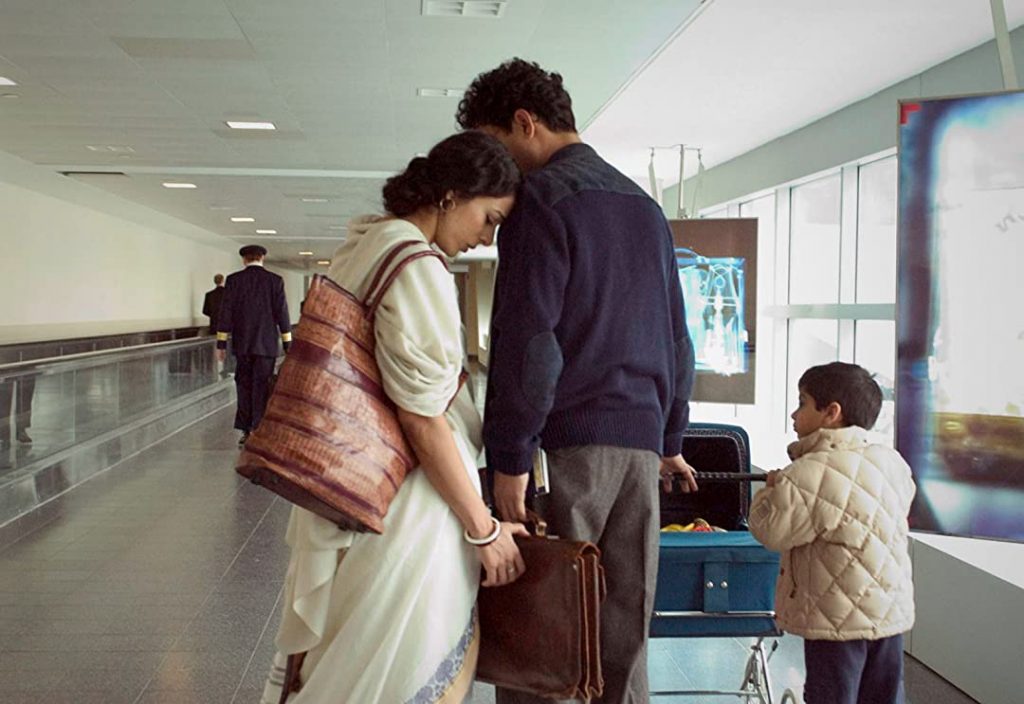Make no mistake; The Namesake is not niche in any sense of the word. It’s as universal a movie as can be: it’s got everything to begin with: cross cultural confusion, Hollywood actors, Bollywood stars, marriages, romances, affairs, divorces, births, deaths, Bengali, Hindi, English – it’s something for everyone. With exceptional performances, a perfectionist director’s stamp, and a canvas sketched by Pulitzer-winning Jhumpa Lahiris book, The Namesake is an important work to be acknowledged.
Mira Nair’s grasp of India and its inherent immigrant Indian-ness is unrivalled among Hollywood directors, and we’ve seen this in the past with Salaam Bombay, Mississippi Masala and Monsoon Wedding – which were excellent films delicately portraying stories of the multitude. Her tryst with a mainstream historical, Vanity Fair, didn’t quite have the same warmth and incisiveness we see in her India-related work. And, given the scope for The Namesake, she’s certainly in full control. As a director, the film is almost without blemish – Nair’s check over the actors, the research, the minutest of details, Nair has it down all pat. And that’s just brilliant. The scene where Ashima has no idea how to react to the phone call she’s just made to the hospital is clearly the director at her best, and not just a performance alone.
Unquestionably, it’s the performances that are the heart and soul of the film. Heart-wrenching at times (Tabu when she gets the news, Lal Penn’s seamless transitions) and heartwarming at others (Irrfan Khan on the waterfront with young Gogol, Tabu’s early days in NYC, the assorted courtships). Alternating between the subtle and the towering are Irrfan Khan and Tabu, truly making their mark at the global level. While Khan has done a lot of international work (The Warrior, Shadows of Time and others), Tabu shows the way for Indian stars how talent and commitment can combine to reach new heights. Kal Penn, Lex Luthor’s dialogue-less sidekick, demonstrates how this wide amount of available talent can deliver when given a chance. Even though he has little time to reflect, he has enough to react to show us how good he is.
Let’s keep the books vs. movies debate aside. Realistically, there was little hope to expect this film to match the book. But Nair and Sooni Taraporevala strive hard to incorporate all events and moments in the 2 hours they work with. But here is where the film hiccups: It’s too hurried. The subject and pace don’t match, but then again it’s really hard to capture Ashima’s lonliness and struggle to cope (such a big part in the book) with such episodic economy on celluloid. Scenes whiz past in the beginning intermittently pausing for breathers, some potent, some irreverent.
And while the book’s languid pace allows it to delve in and out of each character and circumstance, 2 hours is simply not enough to justify a similar approach. Characters seem shortchanged at a screenplay level, especially Sahira Nair who plays Sonia Ganguli. Given the title, perhaps the film would be best centering around Gogol and with lesser stress on the others. But Tabu’s and Khan’s sublime performances overshadow everything else. The metaphor – the equation between Gogol’s name and identity in a different culture comes through beautifully – here is a man born and brought up in a country that fails to recognize him – and yet it really is for Ashima and Ashoke that our hearts go out to.
The conflict in the film comes late, and when it does, it’s not earth shattering. Gogol’s drifting apart is expected and natural, the return not so. The scene with Ashoke explaining the circumstances of naming his Gogol (so pivotal in the film) is overshadowed by Ashima’s loss and circumstance. Structurally keeping the sceneflow linear hasn’t helped either. For example, there was some pointlessness to starting with Ashoke’s accident, only to return to it later, thereby diluting the impact for the audience while Gogol takes it head on. It maybe a decision Nair has made at the editing table keeping the audience in mind, but it seems a compromise.
This film is good for the Indian film industry. Tabu and Irrfan Khan have shown that Indian stars are up there on par with their international counterparts and this should help Bollywood relax a little. Too often various spokespersons have defensively claimed individuality and the homegrown form of the Bollywood film, only to get cold feet and shy away from a truly international market (not NRI!). Even for this film, Rani Mukerji was the initial choice for Ashima’s role but had no time for rehearsals and was subsequently dropped. Hopefully, films like these will change such attitudes, not only for actors but for mainstream makers as well.
English, Drama, Color


